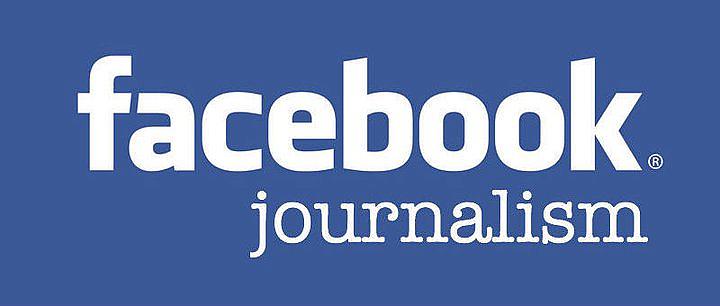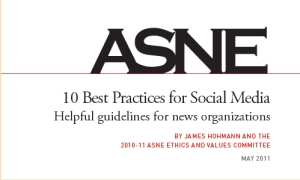Facebook for Journalists: Yay or Nay?

Facebook has a new Journalist Program Manager, Vadim Lavrusik, who says that his position was created "to lead the charge of growing and improving social journalism on the platform." Lavrusik explained how journalists can use Facebook features to share their work and increase their "personal brands" at Nieman Labs yesterday.
If social media increases site traffic and often leads to interesting stories and new sources for journalists, why wouldn't news organizations engage or want their reporters to engage on Facebook? This week at Career GPS, we explore the question of Facebook for journalists. Also find the latest opportunities in health media at the end of this post. Keep up with Career GPS by RSS.
ReportingonHealth has a vibrant Facebook page, in addition to the community on our own site. The Boston Globe recently launched Be Well Boston and over 1,500 people like Los Angeles Times Health. Reporters at the Chicago Tribune have biography pages that link to many social media networks. Health reporter and blogger Julie Deadorff's biography page, for example, links to her personal Facebook profile, Twitter and LinkedIn accounts. Indeed, many health journalists in the ReportingonHealth community use their personal profiles to increase their readership, or have created newly-available journalist profile pages to share their work on Facebook. Daniela Velázquez, a 2010 Health Journalism Fellow, created a journalist page on Facebook to showcase her work, separate from her personal profile.
A comment on Lavrusik's post, however, expresses doubts that journalists attached to news organizations should be building their personal brands in the first place. JS writes, "Where would the news organization fall on this question? They, I think, would encourage everything Facebook enables to be under their banner and refer to their website and advertising atmosphere. Should not the journalist work for the success of the organization?"
 An American Society of News Editors report on social media policies in news rooms released yesterday, shows that many editors are grappling with how to maintain professionalism and also increase revenue through social media. Among ASNE's top ten takeaways are: "4. Break news on your website, not on Twitter" and "8. Social networks are tools not toys."
An American Society of News Editors report on social media policies in news rooms released yesterday, shows that many editors are grappling with how to maintain professionalism and also increase revenue through social media. Among ASNE's top ten takeaways are: "4. Break news on your website, not on Twitter" and "8. Social networks are tools not toys."
So far on Career GPS, we've largely extolled the virtues of using social media to find and distribute stories. Communications researcher Aimee Roundtree told Career GPS in March that too many news organizations don't use Facebook to engage with readers, which is what social media is designed for. "They want to report a story and they ask their followers to send questions pertaining to the story on Twitter or they'll say 'Like us on Facebook.' But to what end?" she asked. "Just to see how many people are listening? They're using it as an addendum, but are they actually using it to design stories?" Self-described social media journalist Paul Balcerak made the argument that journalists need to be where their audience is. If readers seek consumer health information on Facebook, for example, than journalists need to be on Facebook.
But last week, MediaBugs.org creator (and co-founder of Salon) Scott Rosenberg made a questioned the idea that we should build deep networks on Facebook for our professional endeavors. He wrote about the nature of the social network: It is a private company, not the "public sphere."
Here's where my uneasiness comes from: Today Facebook is a private company that is almost certainly going to sell stock to the public before long. It will have quarterly earnings reports to make and pressure to deliver to investors. It is run by almost impossibly young people who have never had to deal with any business condition other than hockey-stick-curve growth. For the moment it appears to be trying hard to operate as a neutral and open public platform; its constant tinkering and rethinking of the design and functionality of its services can be maddening, but so far have tended to be driven by a serve-the-user impulse.
That won't last forever. There are plenty of people waiting to cash in on Facebook's success, and more in the wings, and they will expect the company to fulfill its inevitable destiny - and "monetize" the hell out of all the relationship-building we're doing on its pages.
Kate Gardiner at Poynter expressed similar uneasiness in March, when Facebook released analytics tools for publishers. While traffic might increase, should publishers depend so heavily on traffic generated from a third-party, for-proft company?
What happens to you, the publisher, if Facebook leaks all of your demographic data to your competitors or to the public at large? It's unlikely but it's not impossible. The more likely scenario: Facebook makes you pay for the buttons or the sharing or the Insights - indeed, for access to the audience you've built. And that you're now dependent on.
Does your organization have a page, or perhaps you've started your own public profile? Do pages dedicated to specific topics, such as consumer or community health, have more benefit or purpose that personal pages or those dedicated to whole news organization? Let us know about it in comments and share your views.
New Job and Internship Listings
Publications Intern, American Diabetes Association (via Berkeley Graduate School of Journalism)
Location: Alexandria, VA
Status: Part Time
Medium: Print
Editor, California HealthCare Foundation (via Media Alliance)
Location: Oakland, CA
Status: Full Time
Medium: Print, Online
Scientific Writer and Editor, Kaiser Permanente (via AllHealthcareJobs.com)
Location: Bedford, OH
Status: Part Time
Medium: Print, Online
Reporter, Modern Healthcare (via JournalismJobs)
Location: Chicago, IL
Status: Full Time
Medium: Print
Assistant Web Producer, Health.com (via Ed2010)
Location: New York, NY
Status: Freelance
Medium: Online
Fellowships and Grants
The California Story Fund, California Council for the Humanities
Eligibility: Applicants should have California tax-exempt organizational status or partner with a California tax-exempt sponsor organization as a fiscal agent and be in good standing with CCH. California Story Fund projects must meet various criteria.
Deadline: June 15, 2011 at 5 p.m.
From the Website: "The purpose of CSF is to capture genuine and compelling stories from and about California's diverse communities, and to ensure that those stories can be shared widely. Telling our stories can help us make sense of our existence, give us a window into other people's lives, and make us feel part of something larger than ourselves. Sharing personal and communal narratives can enhance our understanding of where we live, with whom we live, and why we live the way we do. The Council seeks proposals for story-based projects that are informed by humanities perspectives, methods, and content; that reveal the realities of California and its cultures, peoples, and histories; and that will be of interest to local, statewide, and potentially even national and global audiences."
Australian-American Health Policy Fellowship, The Commonwealth Fund
Eligibility: Mid-career health services researchers or practitioners who are U.S. citizens and have completed a master's degree or doctorate (or the equivalent thereof) in health services research, health administration, health policy, or a related discipline. Applicants should demonstrate expertise in health policy issues and track record of informing health policy through research, policy analysis, health services, or clinical leadership.
Deadline: Aug. 15, 2011
From the Website: "This program offers a unique opportunity for outstanding, mid-career U.S. professionals-academics, government officials, clinical leaders, decision makers in managed care and other private health care organizations, and journalists-to spend up to 10 months in Australia conducting research and working with Australian health policy experts on issues relevant to both countries."
California Health Journalism Fellowship, USC Annenberg California Endowment Health Journalism Fellowships
Eligibility: Open to professional journalists from print, broadcast, and online media in California, including freelancers. Applicants need not be full time health reporters, but they need to have a passion for health news (broadly defined).
Included: All-expenses paid seminars in Los Angeles, mentoring for completion of reporting project
Deadline: Aug. 26, 2011
From the Website: "During the Fellowship sessions, Fellows get plenty of time to discuss with experts, and with each other, strategies for covering health news with authority and sophistication. Between the two sessions and for three months after the second session, Fellows confer by phone and e-mail with veteran journalists who guide them through work on major Fellowship projects."
Educational Opportunities
Rural Health Journalism Workshop 2011, Association of Health Care Journalists
Eligibility: AHCJ members (apply via website)
Program: The workshop will take place June 3, 2011 and includes breakfast and lunch.
From the Website:"Even if your newsroom is in a bustling city, there are untold rural health stories down the road. So join us in St. Louis for this special one-day, no-fee workshop to help you find and cover health stories in rural America."

